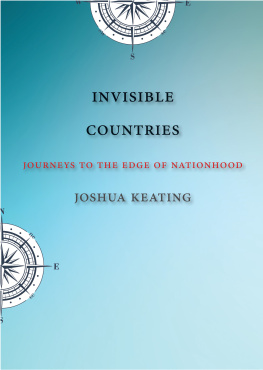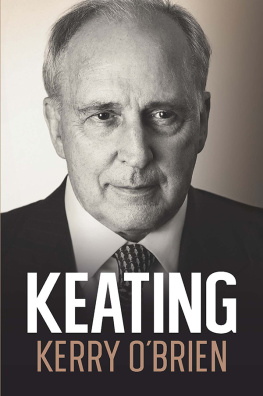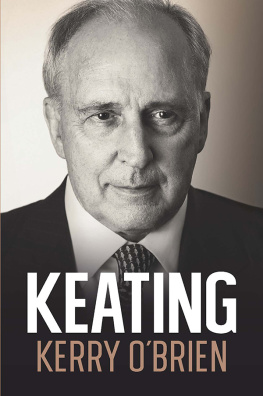Invisible Countries

Copyright 2018 by Joshua Keating.
Illustrations copyright 2017 by Bill Nelson.
All rights reserved.
This book may not be reproduced, in whole or in part, including illustrations, in any form (beyond that copying permitted by Sections 107 and 108 of the U.S. Copyright Law and except by reviewers for the public press), without written permission from the publishers.
Yale University Press books may be purchased in quantity for educational, business, or promotional use. For information, please e-mail (U.K. office).
Set in Adobe Garamond type by IDS Infotech Ltd., Chandigarh, India.
Printed in the United States of America.
Library of Congress Control Number: 2017958268
ISBN 978-0-300-22162-6 (hardcover: alk. paper)
A catalogue record for this book is available from the British Library.
This paper meets the requirements of ANSI/NISO Z39.48-1992 (Permanence of Paper).
10 9 8 7 6 5 4 3 2 1
For Miranda and Thomas
Contents
Authors Note
The goal of this book is to explore how we wound up with the current arrangement of countries on the planet, why that arrangement has stayed relatively static for so long, and whether changing the arrangement would be possible or advisable. The book looks at some of the forces keeping the current map of the world in place as well as some of the forceseconomic, cultural, and environmentalpressuring it to change. The idea to write a book about why its so hard to start a new countryor alter the shape of an existing onecame about long before a confluence of events driven by Vladimir Putin, Xi Jinping, Donald Trump, ISIS, and Brexit made the topic far more timely and applicable to some of the worlds most pressing ongoing crises than it had been.
The case studies in this book are examples of places, both real and virtual, where our comfortable view of the worlds landmass as divided into neat, mutually exclusive territorial units called countries breaks down.
Each of the five countries (all of which I traveled to in 2016) described in this books main chapters illustrates a problem with the world map as currently drawn. Abkhazia, a Russian-backed breakaway enclave, recognized by most of the world as part of Georgia, shows how geopolitical rivalries shape which countries achieve full independence. Akwesasne, an indigenous political community that straddles the U.S.-Canadian border and predates the countries that have emerged on either side of it, challenges the notion that only one kind of nation can be sovereign. Somaliland, a semi-autonomous region in northern Somalia, has achieved all the trappings of countryhood but is simply ignored by most of the international community. The same cant be said of Iraqi Kurdistan, a place regularly in global headlines but continually frustrated in its efforts to challenge the Middle Easts geographical status quo. Finally, Kiribati, a small island country in the central Pacific, has become a poster child for the imminent political disruptions caused by climate change, raising the question of whether a country can continue to exist when the piece of land it is associated with no longer does.
Interspersed with these primary chapters are small sections I call outliers: examples of people refusing to be confined by the world map as currently constructed. They discuss the Sovereign Order of Malta, Estonias electronic residency program, the free-market utopian political experiment known as Liberland, and the struggles of stateless people to have their human rights recognized in a world where national citizenship is all but mandatory.
My hope is that these examples, some well known, some obscure, will lead readers to think more critically about the contemporary map of the world and to consider more creatively what it might look like in the future.
Invisible Countries
INTRODUCTION
What Is a Country?
It was close to dusk on the Black Sea coast when the parade of imaginary countries began.
On the surface, it was an event not unlike the opening ceremonies of any other international sporting event. Sequined divas belted cheesy inspirational pop ballads. Choreographed masses of dancers performed a tribute to the glorious history of the host nation. Athletes, most with little hope of making it past the early rounds of competition, mugged for selfies and proudly waved their flags.
But the twelve teams that had made the journey to the World Football Cup in Abkhazia in June 2016 were representing countries that are not at all like the countries at the Olympics or the World Cup. And none of the flags paraded through the stadium that night are on display outside UN headquarters in New York City. These were countries that most people dont consider countries at all.
The World Football Cup, organized by the Confederation of Independent Football Associations (ConIFA), is where countries compete when they dont meet the threshold of statehood required for membership in bodies like FIFA (the Fdration Internationale de Football Association), the International Olympic Committee (IOC) or, for that matter, the UN General Assembly.
Some were the type of places that are described in news reports by dismissive phrases like breakaway, semiautonomous, or A team represented the Kurds, the largest ethnic group in the world without its own state but one that is now tantalizingly close to achieving the dream of independence. Somali-land, the unlikely and unrecognized beacon of stability in the Horn of Africa, was also represented, as was Northern Cyprus, the Turkish-dominated northern half of the Mediterranean island.
Some teams represented groups wronged by history. The Western Armenia contingent represented a Turkish Armenian community decimated during World War I. The Chagos Islanders, originally from a small archipelago in the Indian Ocean but now living largely in the Crawley area of London, were evicted from their home islands by the British government in 1971 so that the United States could build a military base on Diego Garcia, an expulsion the islanders continue to challenge in domestic and international courts.
Other teams represented ethnic minorities whove found themselves on the wrong side of international borders, such as the Koreans of Japan or the Hungarians of Romania. A Punjabi team purported to represent not only the historical region today divided between the countries of India and Pakistan but the global Punjabi diaspora. A Saami team represented an indigenous group living in northern Scandinavia that has achieved a significant level of political autonomy in recent years. Rounding out the competition were some European regionsPadania, or northern Italy; and Raetia, the Romansch-speaking region of Switzerlandthat seemed less interested in making a political statement than in just playing some football. This team is not like a political thing. I think Italy is fine the way it is, the Padania goalkeeper told me at the opening ceremony.
At the opposite end of the intensity scale was Harpreet Singh, a thirty-three-year-old London accountant who quit his job and poured his life savings into building the Punjabi team. He told me, I dont consider myself to be Indian. The Indians have perpetrated atrocities against Punjab. I dont consider myself British. I dont hate them, but I choose not to be associated with being British. After asking me to imagine how I would feel if my own family were murdered in front of me, he said, If you ask me now, What is your family? my family is all Punjabis worldwide. They are my family. They are more important to me than my own wife and children.
I spent most of my time at the tournament following the team from Somaliland, an unrecognized autonomous stateconsidered northern Somalia by the rest of the worldthat I would visit later that summer. Most of the teams players live in Britain. The teams director, thirty-two-year-old Ilyas Mohamed, said he wanted to build pride among the citizens and diasporic community of a place few in the world have heard of. I feel obliged. Somaliland was where I was born. Somaliland has a lot to offer, but its got a lot to learn from others.
Next page









